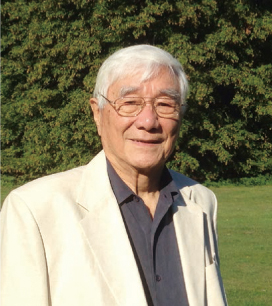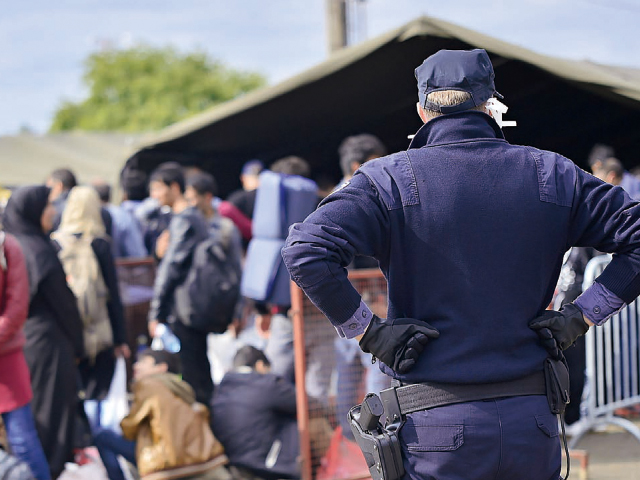Syrian refugees are flocking to European countries and Germany is seeing particularly high numbers of new arrivals. Some economists believe the migrant influx can provide new growth momentum to the affected European countries; Europe, however, was hit by a series of terrorist attacks earlier and conflicts between refugees and their host countries are surfacing. While these migrants may contribute to economic development, is it too high a price to pay?

Kuan Yu-chien, International News Commentator
Kuan Yu-chien: Germany perturbed by the refugee issue
Germany is a humane and open country. The Red Cross and refugee service groups in Hamburg are receiving endless supplies donated by citizens. Such kindness is indeed touching. However, residents of the neighborhood in Hamburg are full of grievances, which are somewhat triggered by media reports. While arguments both for and against accepting refugees have been voiced, the nays have the upper hand. This has made the German people very perturbed.
Humanity and refusal in tug-of-war
 The influx of Middle Eastern refugees is intensifying. Hordes of men in their prime and women who have chucked away their hijabs arrive from Syria, Iraq, Libya, Yemen and Afghanistan every day, despite that EU countries have used all the means possible to halt this wave. EU has even struck a multi-million-dollar deal with Turkey to control refugee influx, but these desperados, in family groups of old and young, just keep coming in from the sea. To save or not to save? That is the question.
The influx of Middle Eastern refugees is intensifying. Hordes of men in their prime and women who have chucked away their hijabs arrive from Syria, Iraq, Libya, Yemen and Afghanistan every day, despite that EU countries have used all the means possible to halt this wave. EU has even struck a multi-million-dollar deal with Turkey to control refugee influx, but these desperados, in family groups of old and young, just keep coming in from the sea. To save or not to save? That is the question.
Countries like Poland and Hungary are taking extreme measures and refusing to accept refugees allocated by the EU. Their actions have caused discord amongst EU members. Some say the refugees will help Europe solve its economic crisis; others say Europe will become a land of Islam in the next century.
Migrant wave: problematic to Germany
To give an overall picture of the situation, I have summarized concerns expressed by the German media in recent weeks into ten headlines.
1. Extremists disguising as refugees: Tightening control over refugee entries, Germany is granting refugee status only to holders of official passports. To its surprise, all migrants have authentic Syria passports overnight. This shows that the Syrian government is supporting this exodus, but how can the German authorities crack the mysteries behind these passports or verify the authenticity of passport holders’ names? How would they know if the IS terrorists have mixed into the crowd?
2. No mention of religious freedom: Western countries have always taken pride in their religious freedom, pointing their fingers at China for controlling the freedom of religion. Now these countries have changed their views. This is exemplified by a demand made openly that all foreign refugees arriving at Bavaria “must accept our culture” by Horst Seehofer, CSU leader and State Premier of Bavaria. In other words, refugees must accept Christianity. What about the Islamic faith then? Already, people are objecting to building new mosques in Germany.
3. Escalating racial exclusion: Without any doubt, xenophobic extreme right-wing groups exist in Germany. The former East Germany, in particular, had a xenophobic history of advocating racial discrimination. It happened in Dresden, the technological hub of Leica, amongst other places. These right-wing conservatives are stepping up their actions today. They are using this situation to voice strong opposition to accepting refugees. These political parties are gaining popularity.
4. Widening wage gaps: Hindered by language and cultural barriers and lacking adequate skills, new immigrants cannot enjoy local German’s level of pay. They become second, third or even fourth rate citizens. Given time, this issue will lead to social instability.
5. The issue of children’s education: Migrants in their thousands have arrived in Germany. The cultural difference is immense and some refugee children have never been to school or kindergarten. Language barrier is also a problem. Should Germany set up special schools just for these children? No matter what solution they adopt, racial conflicts are unavoidable.
6. Poor basic education: In Germany, even a factory worker is expected to be computer literate, especially in this high-tech digital age of the Internet. As such, refugees will only be hired as low-class handymen. Given time, there are bound to be grievances.
7. Higher state fiscal spending: To absorb migrants, Germany is incurring considerable expenses in living subsidies, housing, new schools, teacher training and public order. These expenses are from tax revenue and also public welfare cuts. This has created social pressure.
8. Hatred arouse from refusal of entry: Some refugees in Germany are separated from their families who do not qualify for admittance. Aggravation and grievances are boiling up. At their wit’s end, those who have waited a long time at the border may turn violent if they are eventually denied entry. Gratitude can easily turn into hatred.
9. Illegal livelihood: Recently, the Hamburg police arrested four men, who were among the 40 accepted refugees, for drug offence. Without any means of livelihood, they have become drug pushers. Cases like this will definitely affect law and order in the future.
10. Human trafficking running rampant: The current refugee crisis reminds the media of human trafficking in America more than a century ago when black victims were traded by white dealers. Police of EU countries have found that a group of human traffickers in Europe are capitalizing on the ongoing armed conflicts in the Middle East. They are offering vessels to ship refugees to Europe at high prices, resulting in disastrous consequences.
Readers should note that the above is only my personal synthesis of issues. There are many other issues that require resolution. Once a nice and peaceful place, Europe is now in turmoil because of the refugee crisis. If mishandled, this situation will lead to competing views within the EU and internal strife in the Council. Some conservative politicians may use this chance to propose dissolving the EU. Such a big step backward for Europe would prove catastrophic for the whole world.

Francis Lui, Professor, Department of Economics, Business School, HKUST
Francis Lui: Migrants’ Venturing Spirit and Economic Momentum
Since the Arab Spring broke out in late 2010, masses of refugees have been fleeing from the Middle East and Africa. War-ravaged and homeless, they make their way through the Mediterranean and the Balkans to seek political asylum and abode in EU countries. Reports show that in 2014 more than 280,000 migrants gained entry to EU countries through illegitimate channels. Most of them are from countries like Syria and Afghanistan.
Germany is the final destination for many refugees. According to 2015 data published by the German government, 890,000 people applied for asylum in Germany. The influxes of migrants to European countries are posing huge challenges to the political and economic environment. Lui points out that crisis and opportunity always come hand in hand. Today, capital is adequate on a worldwide basis; the main concern is human resources.
Refugees embody entrepreneurship
 Lui points out that refugees are fleeing from war in their own countries. He said, “Refugees usually head for places with good economy, good social welfare and easy access. Former World Bank economist Branko Milanovic has complied income statistics of worldwide populations and found that the upper-class or the rich in a poor country often earns less than the poor in a rich country. The quickest way to get out of poverty is emigrating to a rich country.”
Lui points out that refugees are fleeing from war in their own countries. He said, “Refugees usually head for places with good economy, good social welfare and easy access. Former World Bank economist Branko Milanovic has complied income statistics of worldwide populations and found that the upper-class or the rich in a poor country often earns less than the poor in a rich country. The quickest way to get out of poverty is emigrating to a rich country.”
It is tragic that refugees have lost their homes, but Lui says frankly they also have better life prospects. “It would have been very difficult for Syrians to apply for residence in Europe. With the refugee status, it becomes much easier because of compassion in human societies.” Lui quoted the view of eminent economist Milton Friedman, “He is renowned for his liberal thinking. He once said we should allow refugees to pick their destinations freely as long as they do not ask for government aids. I don’t think it was an off-the-cuff remark.” Friedman’s parents were poor new immigrants from Europe who arrived in America more than a hundred years ago. They worked hard in the US to climb the social ladder and excelled in their careers. “Friedman saw how new immigrants have contributed to this biggest country of migrants. It is only natural that he sympathizes with them.”
Lui thinks the effects of the Europe migrant wave remain uncertain at this moment. They can be either positive or negative. “In the long run, as long as there is enough time to digest them, 1% to 2% of new immigrants would not have any significant impact on the economy. What the world lacks now is not capital, but talent, and this can be found among the refugees.” According to Lui, refugees in Europe “have a risk-taking mentality.” He said, “They have an entrepreneurial spirit. Given the chance, they would start businesses in their new places of abode. Just like new immigrants who came to Hong Kong from the mainland in the last century, they might create economic miracles. While the outcome is uncertain, this extra source of risk takers is definitely instrumental to growth and development.”
Narrowing the low-skilled labor gap
As the leading power of EU, Germany has received more than 1.1 million refugees since opening up the border to migrants from distant places last August. Voices of the German public reflect that they are finding this burden hard to bear. People are panic-stricken as three attacks involving refugees and Islamic extremism occurred during one week in July. Still, a poll conducted by Forsa finds that 69% of the German population do not blame Chancellor Merkel for the terrorist attacks. It goes to show the German people are relatively accommodating to the refugees.
However, will refugees compete with the locals for jobs when they have successfully settled down? Lui believes the impact will be limited. “Earnings of low-skilled workers may be affected, but not considerably. Developed European countries like Finland and Sweden are so short of low-skilled workers that they have to import them from overseas.” Lui feels that in the long run positive impacts of refugees will outweigh negative ones “because they are prepared to work hard and assiduous.” There will inevitably be conflicts when migrants are integrating into the society, yet the majority of these newcomers will try their best to settle down in their new homes.




